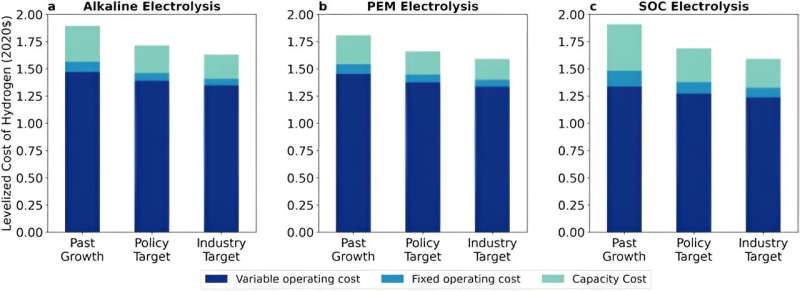This article has been reviewed according to Science X's editorial process and policies. Editors have highlighted the following attributes while ensuring the content's credibility:
fact-checked
proofread
Hydrogen near tipping point to accelerate decarbonization, new research shows

Hydrogen is poised to accelerate the global energy transition as the industry exhibits steep learning curves and finds ways to produce the gas more efficiently and at lower cost, according to a new study from researchers at the University of Mannheim and Harvard Business School.
Green hydrogen has considerable potential to reduce greenhouse gas emissions in industries that are difficult to decarbonize, including heavy-duty transportation, energy-intensive manufacturing, and long-term energy storage. "Widespread adoption of hydrogen, however, is widely considered to depend on substantial cost declines of power-to-gas technologies," explains Professor Gunther Glenk, Assistant Professor at the University of Mannheim and Climate Fellow at Harvard Business School.
The new study published in the journal Energy & Environmental Science, which Glenk co-authored with Philip Holler and Professor Stefan Reichelstein (both University of Mannheim), estimates how quickly gains are made for different hydrogen technologies. Based on global observations of installed power-to-gas systems, the authors project that the life-cycle cost of clean hydrogen production will likely fall in the range of 1.6–1.9 US dollars/kg by 2030, a decline from about 3–5 US dollars/kg today.
Recognizing the potential of hydrogen as a decarbonized energy source, governments around the world have recently introduced sizeable regulatory initiatives and subsidy programs for the development, manufacturing, and deployment of hydrogen equipment. The U.S. Department of Energy also articulated the prominent Hydrogen Shot initiative in 2021. According to this initiative, the cost of producing clean hydrogen is to come down to $1.0/kg by the year 2030.
Investors are often skeptical of ambitious targets for sustainable energy set by governments and international bodies trying to reach net zero. But this new research shows that industry trends are achieving a level approaching, though not quite achieving, the $1.0/kg cost target set by the U.S. Department of Energy.
"Once you have deployment in place, you can get cost reductions. With cost reduction, there's more deployment because more applications become financially attractive, which then leads again to more deployment and cost reduction. It's a virtuous cycle that can change the game," says Glenk.
More information: Gunther Glenk et al, Advances in power-to-gas technologies: cost and conversion efficiency, Energy & Environmental Science (2023). DOI: 10.1039/D3EE01208E


















